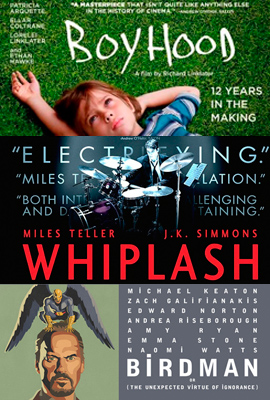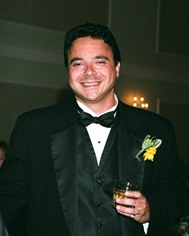 If you’re like me, when everyone trots out their ten best lists or Oscar predictions, I really don’t need six different people telling me the same movie’s good- I usually have a pretty good handle on what was worth watching. Also, the lists are mostly repetitious with the exception of an independent movie I’ve missed because it played in the theater for a week, so I’ll keep a mental note to catch that film when I can. No, what really interests me is the one film or performance that’s the most memorable, the one that stood out. In keeping with the tradition of the late Siskel & Ebert’s “If we picked the Oscars” specials, here are my standouts for 2014 using the main Academy Award categories. These are the films and performances that I’ll remember most- simply put, these are the ones:
If you’re like me, when everyone trots out their ten best lists or Oscar predictions, I really don’t need six different people telling me the same movie’s good- I usually have a pretty good handle on what was worth watching. Also, the lists are mostly repetitious with the exception of an independent movie I’ve missed because it played in the theater for a week, so I’ll keep a mental note to catch that film when I can. No, what really interests me is the one film or performance that’s the most memorable, the one that stood out. In keeping with the tradition of the late Siskel & Ebert’s “If we picked the Oscars” specials, here are my standouts for 2014 using the main Academy Award categories. These are the films and performances that I’ll remember most- simply put, these are the ones:
Best supporting actress: Emma Stone, “Birdman”
In a movie where characters swirl around the eye-of-the-storm focal point of protagonist Riggan (Michael Keaton), Stone’s character of freshly-rehabbed daughter Sam seems like just another problem Riggan has to deal with during his breakdown. But she’s the touchstone of the film, and nothing brings that home more than the scene in which Sam confronts Riggan, deflating his ego by telling him he’s not that good. It’s a scene that lasts only a few minutes, but the camera focuses only on Sam and Stone’s monologue rivets you. It’s a scene that not only grabs you in the film’s story, it also makes you realize that Stone can really act. Along with her rooftop scenes opposite Edward Norton, Stone’s performance galvanizes “Birdman.”
Best supporting actor: J.K. Simmons, “Whiplash”
I’m easily charmed by the unorthodox authority figure, but Simmons does it with such flair that he steals every scene he’s in. As a revered music instructor at a prestigious music school, Terence Fletcher (Simmons) reduces all of his reverence and prestige into fear and rage as he demands excellence from his students under penalty of psychological abuse and physical pain through extended practice. In a movie about the price of perfection, Fletcher perfectly exacts that price on drumming student Andrew (Miles Teller) and the teacher/student battle-of-wills has rarely been done better. With his steely gaze and formidable presence, Simmons captures the essence of the modern-day iceman in the guise of an academic devil incarnate.
Best actress/best adapted screenplay: Reese Witherspoon/ Nick Hornby, “Wild”
This movie unfolds in layers, using flashbacks to inform us why we’re watching Cheryl Strayed’s 1,100 mile hike along the Pacific Crest Trail- it’s a story of personal redemption. In Hornby’s well-written scenes and screenplay structure, we slowly begin to understand Strayed’s motivation in embarking on this physical journey and the more we learn about Cheryl, the more we care. But it’s really Witherspoon’s performance as Cheryl Strayed that makes us want to care- she brings all of the tough and tender nuances of Cheryl’s character to bear. Not only do I think it’s her best performance to date, it’s really one of the best cinematic character studies I’ve seen in a long time.
Best actor: Eddie Redmayne, “The Theory of Everything”
Apart from being spot-on in his appearance as scientist Stephen Hawking with its inherent physical demands, Redmayne did something more than just a good imitation. Watching Hawking succumb to Lou Gehrig’s disease, Redmayne expertly displayed the gradual physical breakdown but also brought a wit and determination into the character that serves as a foundation for the audience that keeps our spirits up as everything around Hawking crashes down. Our understanding of Hawking’s mindset as his physical decline directly conflicts with his newly-married life and prospects for the advancement of his scientific career is due more to Redmayne’s performance than the script- to Redmayne’s credit, we’re able to grasp the film’s message of the mind not being hampered by physical or societal limitations with a greater ease and more profound resonance.
Best director: Alejandro Gonzalez Inarritu, “Birdman”
Great directing serves its story well, and Inarritu’s direction makes “Birdman” complete. His ability to bring the audience into the mind of Riggan (Michael Keaton), who is experiencing a mental breakdown or has mentally broken through to another realm, is a feat in itself. But through fantastical images merging with everyday life, continuous camera movement that flies through the air and floats through hallways, we can also experience what Riggan’s alter-ego of the Birdman must feel like and the fluidity of the film also serves the atmosphere of the microcosm of the backstage theater world in which the story takes place. Inarritu gives us all of these senses in such a singular way that “Birdman” really is one of the best directed movies I’ve ever seen.
Best film/ best original screenplay: Richard Linklater, “Boyhood”
Great writing has a universal feeling, an underlying truth, and makes the ordinary seem extraordinary- Linklater’s screenplay achieves all three. Spanning the stage in our lives between the ages of 5 and 18, we see ourselves in the similar life experiences depicted in the life of the film’s protagonist Mason (Ellar Coltrane). While the details of our lives may be different from Mason’s, the air of everyday life- growing up, parental talks, hanging out with friends after school- gives the film its breath. With a realistic tone and nostalgic charm, Linklater manages to create an individual’s story that feels like our own. Great films inform as they entertain, and “Boyhood’s” message of carpe diem has rarely been told as well or lingered as long in its viewer’s subconscious.
Here’s hoping you’ve had similar enjoyable singular experiences in 2014 and are looking forward to the best that 2015 has to offer.
